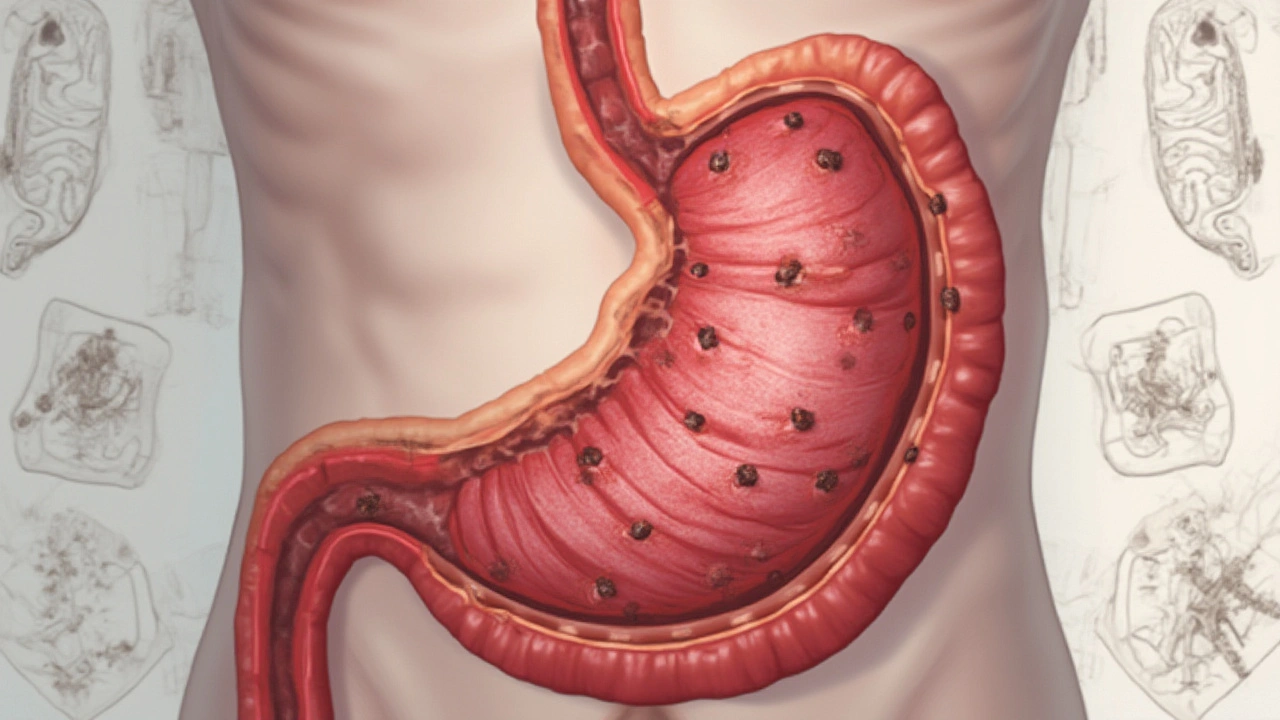What if your stomach silently stopped absorbing nutrients, slowly sapping your energy and putting your whole body at risk—and you barely noticed? That’s exactly the sneaky danger of atrophic gastroenteritis. Lots of people mistake it for simple indigestion, a bland diet, a tough week at work. But this condition isn’t just about the inconvenience of stomach upset; it’s a chronic problem that can open the door to serious health issues. Ignore the early warning signs and you could end up facing risks nobody wants—malnutrition, anemia, and irreversible gut damage. Now that’s a wake-up call.
Understanding Atrophic Gastroenteritis: What It Actually Means
First things first: atrophic gastroenteritis is not just heartburn or a bad meal. It’s a long-term inflammatory disease where the stomach lining thins out, sometimes because of an attack by the body’s own immune cells, sometimes triggered by an infection or a nasty reaction to certain medications. This thinning—the “atrophy”—leaves your stomach less able to produce acid and enzymes that break down your food. Fewer digestive juices mean your body struggles to pull out the good stuff like vitamin B12, iron, and protein from what you eat.
A lot of the time, it doesn’t even start with dramatic symptoms. Maybe you just feel more tired. Maybe food doesn’t agree with you, or you look paler in the mirror. But here’s the kicker: those signals get written off as stress or age. In a 2023 study published in the American Journal of Gastroenterology, nearly half the people diagnosed admitted they waited over six months before even mentioning symptoms to their doctor. That’s six months too long. The good news? When you catch this disease early, you cut the risk of severe vitamin deficiencies, neurological problems, and in rare cases, certain types of stomach cancer, right off at the knees.
Doctors still argue about what actually causes atrophic gastroenteritis—often, it’s a mix of genes, environment, and outside triggers. Helicobacter pylori, a spiral-shaped bacterium that loves to set up shop in your stomach lining, remains one of the top culprits worldwide. Long-lasting infection with this bug sets off chronic inflammation. Sometimes autoimmune disorders are to blame; your own immune system mistakes healthy cells in the gut for invaders and starts attacking them. Drugs, especially NSAIDs or long-term antibiotics, can play a role too. What all these triggers have in common: they put your digestion on the fritz.
Even more interesting, atrophic gastroenteritis is far from rare. Global data from 2024 shows rates climbing, especially as people live longer and more folks get regular blood tests for unrelated reasons. By age 60, about 5% of adults in developed countries have the hallmarks of stomach atrophy—often without noticing a thing. In regions where H. pylori is more widespread, that number soars, particularly in East Asia and parts of Eastern Europe. So if you think you’re not at risk, you might want to think again.
Here’s something curious: atrophic gastroenteritis changes aren’t always visible on simple scans. Ordinary bloodwork might pick up low iron or a vitamin B12 dip, but the damage can stay invisible unless your doctor knows what to look for. That’s why lots of cases fly under the radar until problems start piling up. For those with a family history of autoimmune diseases or those with longstanding digestive problems, early and regular screening might actually be a good idea—not just for peace of mind, but for real preventive action.
Let me show you just how wide-reaching this illness can be, with a quick look at the complications doctors actually see in patients:
| Complication | Frequency (in diagnosed cases) | Typical Onset (after first symptoms) |
|---|---|---|
| Anemia | 35% | 12-18 months |
| Vitamin B12 Deficiency | 28% | 1-3 years |
| Chronic Fatigue | 44% | 6-12 months |
| Neurological Issues | 14% | 2-5 years |
| Increased cancer risk | 8% | 5+ years |
Let’s break it down further: that slow creep of iron and B12 deficiency dulls your thinking, puts your nerves on edge, weakens your immune defenses, and can even cause numbness or tingling in your hands and feet. If you’re an older adult or have another autoimmune disease on top, those risks go up. All of this comes down to one thing: pay attention to your body’s signals, and don’t assume tiredness and stomach trouble are just “normal.”

Spotting the Warning Signs and Getting the Right Diagnosis Early
Catching atrophic gastroenteritis early isn’t just nice for comfort—it can seriously change the long-term outcome. That’s because early treatment can actually halt the damage, prevent scarring, and get your gut back on track. But first, you need to know what you’re looking for. What sorts of signs tip people and their doctors off?
- Unexplained fatigue—tired no matter how much you sleep
- Pale, sallow skin or mouth ulcers
- Loss of appetite, feeling full fast
- Stubborn indigestion, bloating, or burping more than usual
- Weight loss without trying
- Numbness, tingling, or weird “pins and needles” in fingers or toes
- Recurring infections or feeling sick a lot
Here’s what’s tricky: these symptoms are vague. They can be blamed on stress, work, or a million other things. The first move is getting checked out with careful blood tests. Doctors check for iron, vitamin B12, and sometimes an antibody called anti-parietal cell antibody (APCA), which targets the stomach’s acid-producing cells. If these are out of whack, you’re on the right path for more investigation.
Stomach endoscopy—the infamous “tube down the throat”—isn’t anybody’s favorite, but it’s often needed. This is the tool doctors use to actually see the stomach lining. In atrophic gastroenteritis, that lining looks thin and pale, sometimes with visible scars or erosions. Biopsies taken during the scope help confirm what’s really going on. In some countries, lab testing now includes measuring pepsinogen levels (a protein made in the stomach) and the hormone gastrin. Those results help tell if there’s stomach cell loss even before symptoms get ugly.
But it’s not all high-tech. Family history also matters. If close relatives have a record of autoimmune problems, B12 anemia, or even stomach cancer, you’re at higher personal risk. People on long-term drugs that can irritate the stomach, such as NSAIDs (think ibuprofen), should push doctors for regular stomach checkups if symptoms crop up.
Now, you might be thinking: is all this testing really necessary? Could this just be the latest medical scare? Here’s something worth knowing: catching atrophic gastroenteritis before it turns advanced dramatically reduces the risk of long-term disabilities—no more “mystery” illnesses popping up year after year. Early diagnosis can mean a straightforward, targeted therapy instead of years spent chasing your tail with vague symptoms and no answers.
Don’t leave things to chance. If symptoms linger or your doctor’s first round of tests find low nutrients despite a decent diet, push for more action. The difference between early and late diagnosis can mean fending off years of needless suffering. The earlier you act, the more you control your outcome, plain and simple. You don’t need to treat every stomachache as a sign of disaster, but persistent issues deserve respect—not neglect.

The Power of Early Treatment: Approaches That Make a Difference
So you’ve got the diagnosis. Now what? The key is stopping damage before it goes too far. Treatment depends on what’s causing the atrophy in the first place. If the culprit is an infection like H. pylori, antibiotics can clear it up—this alone leads to symptom relief in up to 80% of caught-early cases, according to a large multicenter European trial from late 2022. For those with autoimmune causes, doctors work to tame the immune response, usually with drugs that are less harsh than what’s used for other autoimmune diseases. Think low-dose corticosteroids, often paired with careful nutrition plans.
The real game-changer? Replacing lost nutrients. Almost every case needs vitamin B12 supplements, either as regular injections or high-dose tablets. Iron runs low in about one-third of patients, so doctors keep a close eye on levels and top them up when needed. If protein absorption is off, adding certain protein-rich, easier-to-digest foods can prevent the worst muscle-wasting and weakness. There’s no “one-size-fits-all” menu; a good doctor works with a dietitian to create a plan tailored for your unique needs, factoring in things you actually enjoy eating.
- Take prescribed medications as directed—don’t skip doses, even when symptoms fade.
- Stick with all recommended blood tests; don’t ignore follow-up calls from your doctor.
- Report new or changing symptoms—especially if you notice numbness, weakness, or trouble walking.
- Work with a dietitian to spot hidden food triggers or gaps in nutrition.
- If you take medications known to irritate the gut, discuss safer alternatives with your provider.
It’s not just medication and diet. Stress plays a sneaky role. Chronic worry triggers stomach inflammation and weakens the protective barrier of the gut. Practical stress management—exercise, mindfulness, or even just a good night’s sleep—it all chips away at the background inflammation and helps the body heal.
Some folks try alternative remedies: probiotics, digestive enzymes, or herbal supplements. While there’s little proof these reverse atrophy, some people notice improved symptoms and steady energy with certain strains of probiotics, especially those aimed at restoring a healthy balance in the gut. Always check with your doctor before adding any supplement, since some can clash with prescription meds or even make things worse if not chosen wisely.
Don’t underestimate the value of regular monitoring. Everyone with atrophic gastroenteritis should get checked for stomach cancer risk over time, especially if they started losing stomach lining young or have a family history. In Japan, where rates are highest, regular endoscopies actually save lives by catching cancer early—those gains can be real anywhere.
One more thing: energy levels can come back, but it rarely happens overnight. It may take months of steady treatment before you feel truly back to yourself. Don’t get discouraged. Celebrate small wins—the days you wake up alert, the meals that go down comfortably, the blood test marking improvement. Every step counts.
If you suspect something’s up with your gut, speak up sooner rather than later. Atrophic gastroenteritis doesn’t care about your schedule, your job, or your plans. But catching it early gives you the control to stop it in its tracks. Stay curious about your health—your body is usually trying to tell you something. The sooner you listen, the better the outcome will be.

9 Comments
Aarti RayJuly 16, 2025 AT 21:27
i used to think my fatigue was just from working double shifts but after my b12 dropped to 180 i finally got tested and turns out i had this whole stomach thing going on lol
Alexander RolsenJuly 17, 2025 AT 01:47
Another overhyped medical scare designed to sell endoscopies and B12 injections... The real cause? Americans eating too much processed garbage and then panicking when their guts rebel. Stop blaming your stomach-blame your diet.
Leah DoyleJuly 19, 2025 AT 00:53
OMG I JUST REALIZED I HAVE MOST OF THESE SYMPTOMS 😭 I’ve been tired for years and thought it was just ‘adulting’... I’m booking a doctor’s appointment tomorrow. Thank you for posting this-so many people need to hear it.
Alexis MendozaJuly 20, 2025 AT 20:19
It’s funny how our bodies whisper before they scream. We ignore the quiet signs-fatigue, bloating, pale skin-because we’re busy. But maybe health isn’t about fixing things when they break. Maybe it’s about listening when they’re just... humming wrong.
Michelle N AllenJuly 22, 2025 AT 15:33
I read this whole thing and honestly I’m not sure if I care enough to get tested. I mean I get tired sometimes and my stomach acts up after tacos so maybe it’s just me being lazy or eating too much cheese
Madison MaloneJuly 22, 2025 AT 20:50
Hey if you’re reading this and feeling off-don’t wait. I had the same symptoms for two years and thought it was stress. Once I got my B12 levels fixed and started working with a dietitian, I felt like a new person. You’re not imagining it. Your body is trying to tell you something. Take it seriously.
Graham Moyer-StrattonJuly 23, 2025 AT 18:56
Stop medicalizing normal life. People used to live without endoscopies. You’re not broken. You’re just out of shape.
Jacob Hepworth-wainJuly 25, 2025 AT 02:55
My mom had this. She got diagnosed after passing out at the grocery store. Turns out her B12 was so low her nerves were shutting down. She’s on monthly shots now and feels 20 years younger. Don’t ignore the signs. It’s not just ‘getting older’.
Craig HartelJuly 25, 2025 AT 03:09
Just wanted to say-this post gave me hope. I’ve been scared to go to the doctor for years. But reading about people turning things around makes me feel like I can too. Thanks for sharing. You’re not alone.